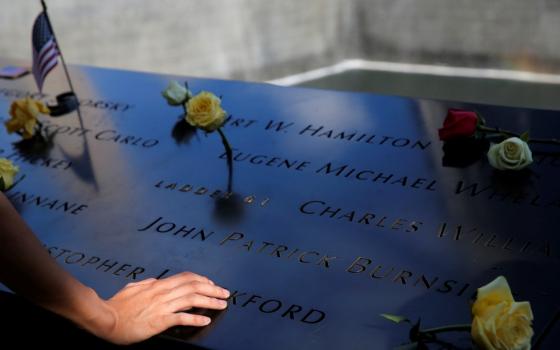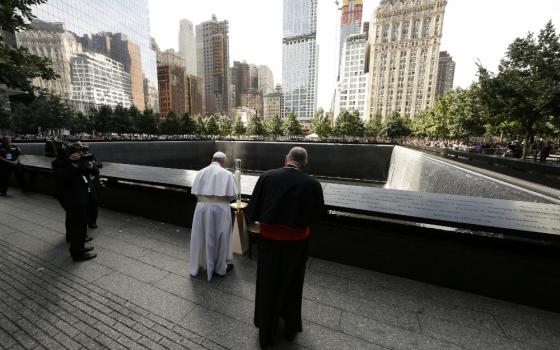We arrive at the memorial already soaked. The rain has been pouring down for about an hour, making our one little umbrella woefully insufficient for our entire group. We huddle in the cab, unwilling to take that first step out into the dark, wet city.
We are five Catholic sisters from different corners of the United States, bonded by our vocation and by our participation in Giving Voice. Earlier in the day we had scrawled our names on a large piece of paper hanging on the wall at the bi-annual national Giving Voice conference in a suburb of New York City. We had spent the past three days praying together about healing divisions and building bridges. On this, our one free night of the conference, groups had self-organized into different activities; with bright markers we had written our names under the phrase "Go into NYC." Before we met up to take the train into the city, different hopes had been named: someone wanted to eat pizza, another was interested in seeing Times Square. I said I wanted to visit the National September 11 Memorial. As for our route and itinerary, we agreed that we'd figure out our adventure as we went along.
We felt a lot of giddiness and excitement during the earlier events of the night — finding our way out of Grand Central Station, laughing at the entertainers in Times Square, eating pizza slices on a sidewalk and walking along Broadway. It had started to pour while we looked around Rockefeller Plaza, and it was getting late. Yet we decided we still wanted to try to visit ground zero. Then we giggled when we figured out how to hail a cab.
As we rode through the Manhattan streets I remembered how I had shared a meal with a New Yorker earlier in the summer; it occurred to me that this was likely why I wanted to visit the memorial. During the meal, I held the woman's hand and cried with her as she spoke of a poem that touched her deeply, a poem that told the story of the search dogs at ground zero. I told the other sisters about the expressionless man the woman said she encountered on a train on Sept. 11, 2001; he stared blankly, every square inch of his business suit, brief case and body grayed by a thick layer of ash. She didn't doubt she had seen a ghost that day, and I didn't either. As I told the tale to the other sisters, the uncertainty of mystery seemed to manifest itself in the dark corners of the city on the other side of the car windows.
I am the last to leap out of the cab. I fall right into a puddle; water flows around my sandal straps and briefly covers my ankles. We bolt across the busy street and slosh over wet concrete and stone to enter the open space of the memorial grounds. The lights of Manhattan dance in the wavy puddles.
We are momentarily stilled when we cross the threshold into the solemn space. We gaze around, noticing that the reflecting pools are roped off and that the walkway is mostly empty. We are not surprised; we know we've arrived after closing time. I feel a dark heaviness press downward upon my shoulders, head, heart. I wonder if I would feel the same way if I stood on the grounds of a concentration camp.
Some spaces are made into holy ground by a consecration, when oil and prayers anoint pillars and doorways or when holy water is sprinkled into crevices. Other grounds, like ground zero of the Sept. 11 World Trade Center attacks, are sanctified by the cries and screams of the terrified, by blood and death, by the angels who bring souls onward to heaven. The tears are the holy water; the acts of service are the prayers of consecration.
Walking through the memorial grounds, we don't know what to do with ourselves, what to do in the dark and the downpour. We see other people jumping into a doorway, so we follow them and end up seeking refuge inside a strange, futuristic looking building. Water drips out of our hair as we stand in the doorway. What is this place? Where are we?
Confused, we hesitantly enter the mammoth building, the immensity of its white-ribbed space evoking thoughts of Jonah's whale. Gazing downward into a canyon of brightly lit white marble, we realize we aren't in a hotel or museum. The word Westfield catches my eye from somewhere and brings with it a horrific realization: this is a new shopping mall built on holy ground. Our culture has chosen to build spaces to worship the gods of consumerism while churches lie empty where crowds once worshipped Christ. I feel sick. Dizzy and ready to vomit, I leave the building and head back into the rain.
A couple of sisters come with me and we wander out into the roped-off memorial grounds again, lost in the liminal space. The somberness clings heavy to our wet skin. We find the other reflecting pool and consider crossing under the ropes to see more clearly the names memorialized there but realize the security guards are watching us closely. Instead, we pray. Standing close together in a circle, sharing our one tiny umbrella, we speak out loud to God. We pray for the dead and their families, for healing and for peace. We shudder, from crying or from the cold and the rain; we aren't really sure. We are a holy trinity of sisterhood marking this spot sacred with our feet.
During ages such as these, in this time of terrorism and disasters, my sense is that the Spirit is inviting all of us to become masters of reverence. We must tread upon all ground with mindfulness and gratitude; we must move with care and kindness. Each encounter of grounds made holy — whether by the horrors of history, the hurt of humanity or by God's creative work—is an opportunity to pass through with consciousness and love. In a modern way, we must find ways to heed the ancient command: "Remove your sandals from your feet, for the place where you stand is holy ground" (Exodus 3:5). When we venerate God's power over the ground, we acknowledge that we are small, we are connected and we are only visiting — all of this is holy communion.
The three of us stand there, praying together in the darkness. Our breathing shifts, softened by our prayers; small grins creep over our sad faces. Even here, we are glad for the renewal offered by calling on God's name. Moved by our visit to this holy ground, we move onward through the night and toward more hallowed, hurting grounds.
[Julia Walsh is a Franciscan Sister of Perpetual Adoration, a retreat presenter and a blogger who can be found online at MessyJesusBusiness.com.]


